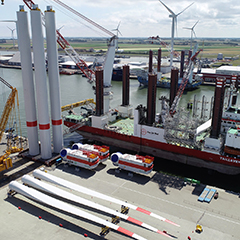- Buss Terminal Eemshaven serves as base port for the foundation structures of the Hornsea Two offshore wind farm.
- The first transition pieces have arrived at the terminal.
- Profound experience in port logistics and heavy lift equipment for handling the foundation sets is required.
Hamburg. The first six transition pieces for Ørsted’s Hornsea Two offshore wind farm have arrived from Great Britain at the Buss Terminal in Eemshaven, Netherlands. The wind farm will be the largest offshore wind farm in the world, dispersed across an area of 462 km2 when it is commissioned in 2022.
Over the next months, Buss will receive a total of 165 foundation sets, which will be handled and stored on the terminal. These foundation sets consist of a monopile, which is installed into the seabed, and a transition piece, which connects the monopile with the tower of the wind turbine. Approximately 140,000 m2 of the 250,000 m2 heavy lift terminal will be used for this project. The foundation sets will then be loaded onto the installation vessel “Innovation” and installed at the wind farm.
Buss will not only provide the personnel and the storage area but will also be responsible for the project management of the base port logistics and the required equipment. Profound experience and special heavy lift equipment is required to handle these large components.
The unloading of the transition pieces from the transport barge is carried out by a crawler crane type LR1750. At the terminal itself, Buss uses a gantry crane on SPMT axles to move the almost 350-ton transition pieces. The monopiles weighing up to 1,230 tons are also moved with SPMT axle lines and dedicated transport saddles. The self-powered transporter has 96 pendulum axles and can raise and lower the monopiles hydraulically.
Hornsea Two is located approximately 89 km off the Yorkshire Coast in the North Sea. The wind farm of the Danish energy company Ørsted includes 165 Siemens Gamesa 8-megawatt turbines. With a total output of almost 1.4 gigawatts, it can supply over 1.3 million households with green energy.
“We are delighted that the starting signal for the project has now been given. For us, a project of this magnitude is a great sign of confidence in the performance of our project team in Hamburg and our terminal in Eemshaven”, comments Martin Schulz, Managing Director of the Buss Energy Group, on the project launch.
The Buss Terminal Eemshaven won the tendering procedure of the client DEME Offshore in February and is now responsible for handling, storage and terminal logistics of the 165 monopiles and transition pieces on its own terminal site.
About Buss Energy Group
The Buss Energy Group is one of the leading companies in onshore and offshore wind energy. Its services in Germany and Europe include the installation and repairing of wind turbines and rotor blades both onshore and offshore. In addition, Buss offers the operation of port facilities and the entire base port logistics. Internationally experienced project managers as well as various quality and occupational safety services complete the portfolio. The Buss Energy Group is part of the Buss Group, which is celebrating its 100thanniversary this year and employs around 500 people.
About Buss Terminal Eemshaven
The Buss terminal in the Dutch port of Eemshaven is located in the immediate vicinity of the offshore wind farms in the North Sea. The terminal is 250,000 m2 in size, the quay length is 694 m, and with a capacity of up to 35 tonnes/m2 area load, it specializes in the handling of offshore components and heavy cargo. The terminal has already handled ten large-scale offshore projects, as its direct access to the open sea makes it the ideal interface for offshore logistics.
Further information and image material



























